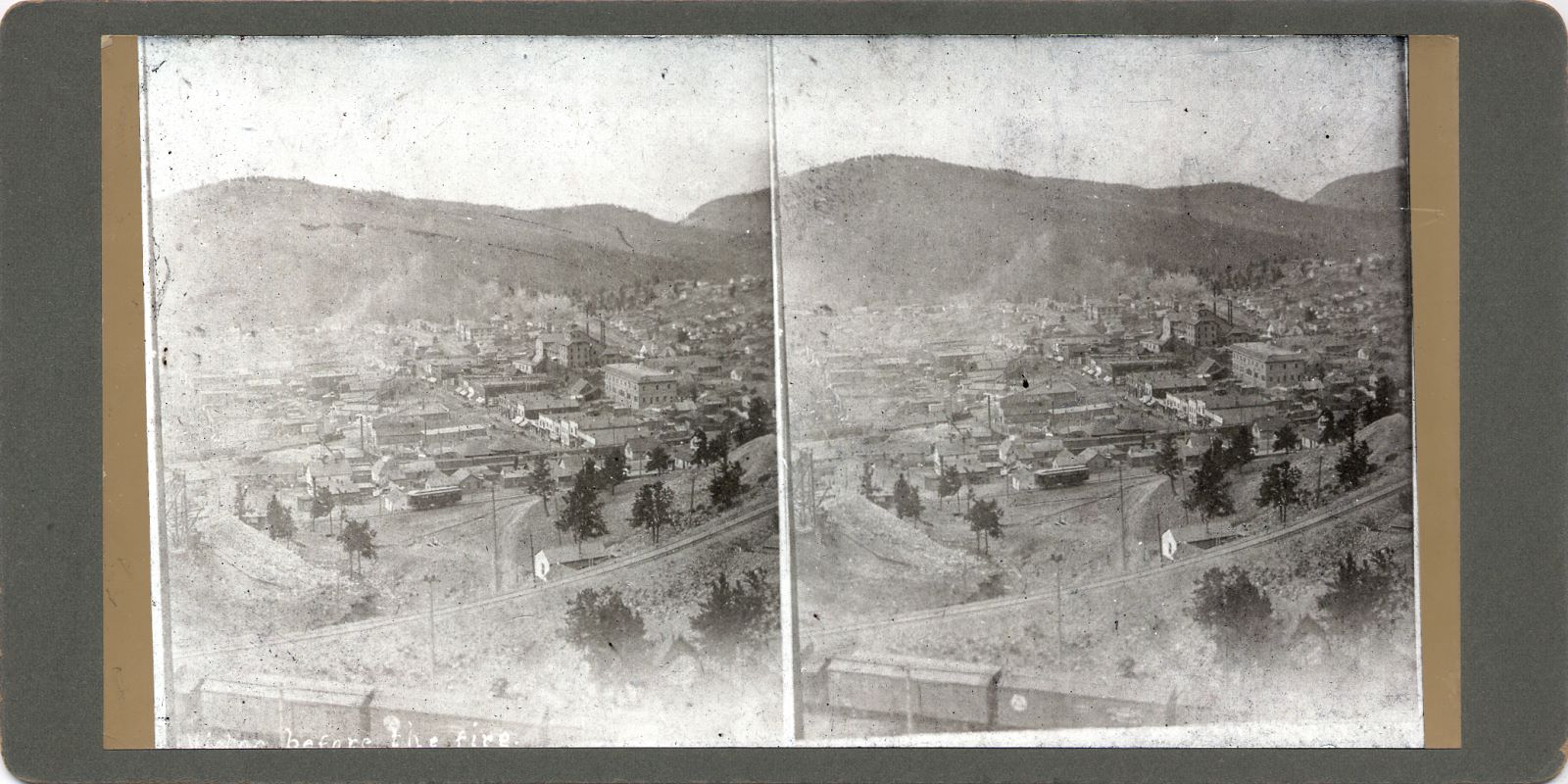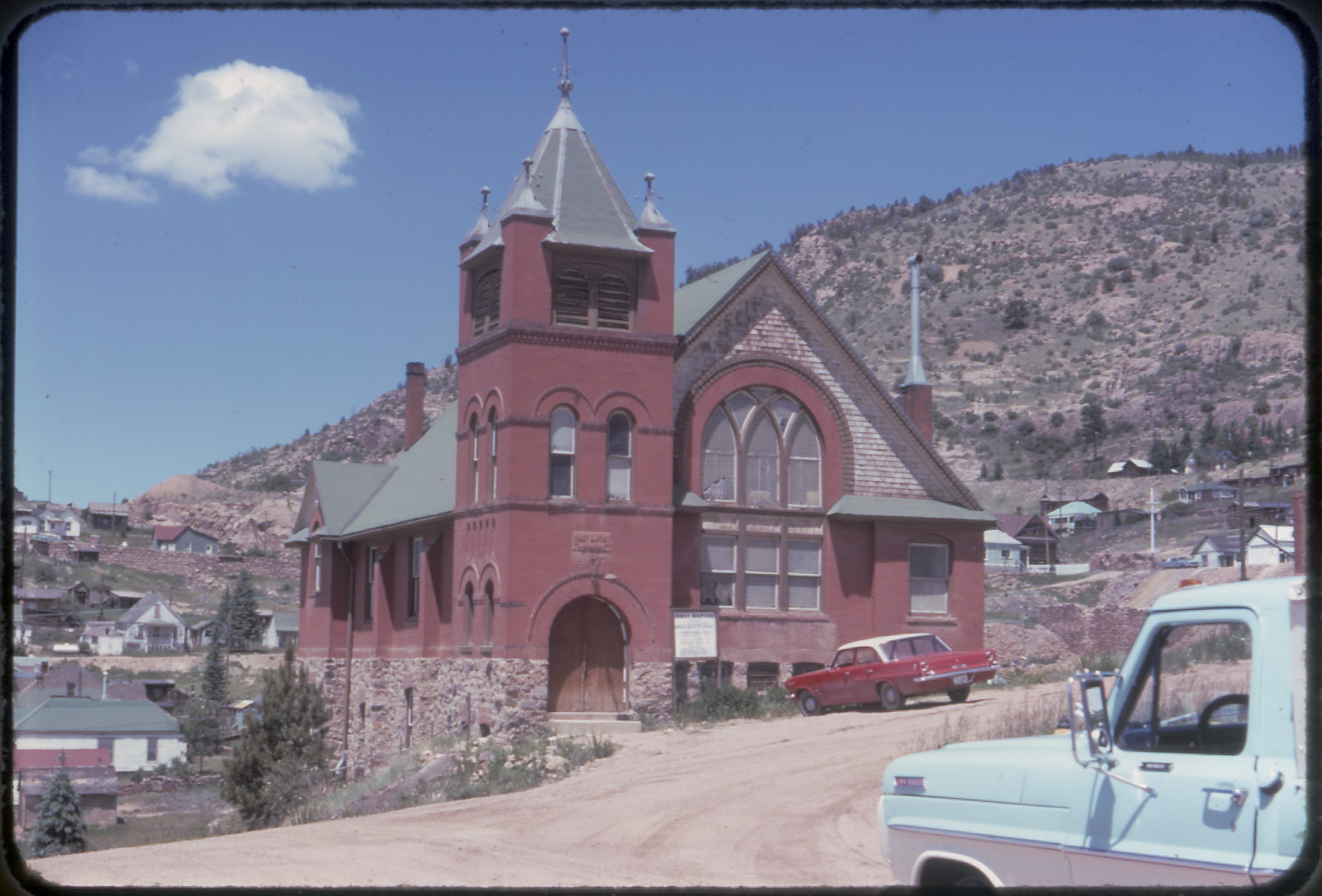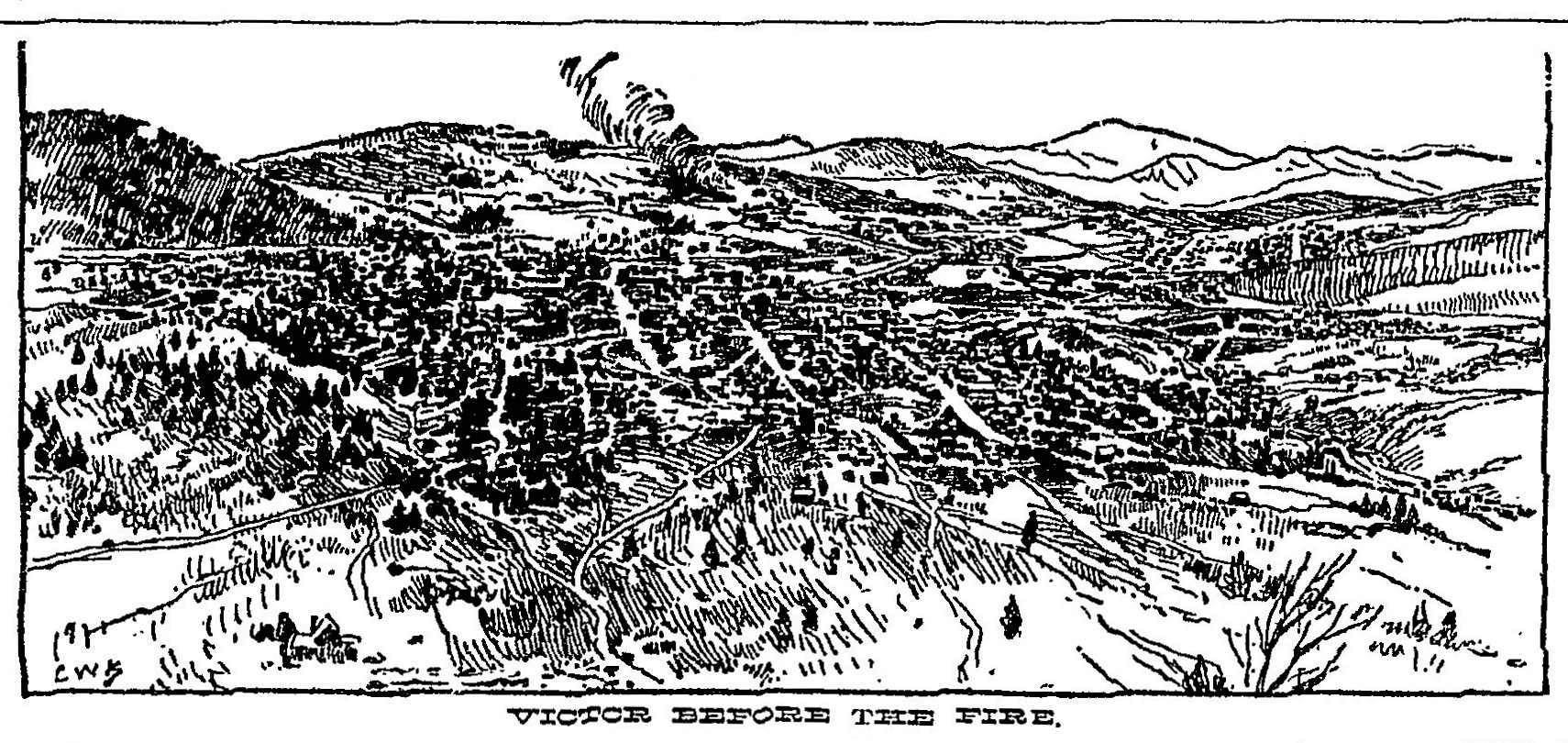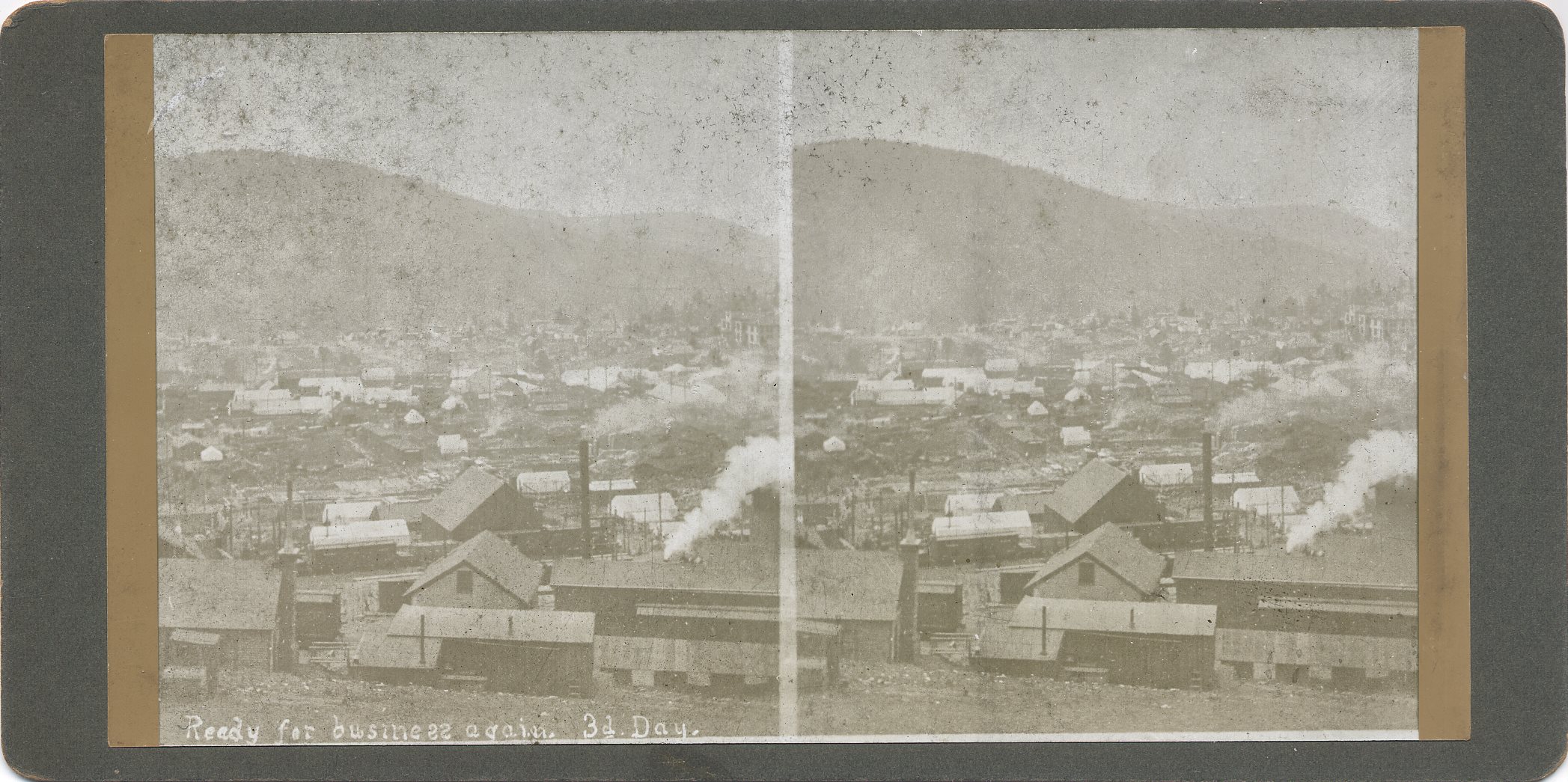-> Found at the Colorado Historic Newspaper site. Or direct to the text.
Sunday Morning, December 31, 1899.
(page 15, or numbered 11)
Source had no real images, only a line/pen type of drawn image, so I used some images from my collection.
The history of the growth and business progress of our sister city of Victor from a little hamlet of a few hundred inhabitants in 1893 to its present large proportions and importance among the municipalities of the state is a matter of gratification and pride, not alone to its residents, but to the people of the entire Cripple Creek district.
Picturesquely located on the undulating southern slope of Battle mountain—that vast treasure vault of gold—it is the first town of any great importance to meet the traveler's eye on either railroad. The snug little commonwealth has indeed made rapid strides since the Monta Rosa company laid out the townsite six years ago and now has a population of something over 12,000 and in spite of its recent baptism by fire is pushing successfully to the fore and is keeping pace with the development and rapidly enhancing value of the great coterie of mines adjoining and surrounding its suburbs.

Stereoview showing Victor Before the Fire;
A View Down Battle Mountain With a Trolley on the Original High Line Grade.
To a person unfamiliar with the hustle and business energy of the people of Colorado the great advance made by Victor in so few years time must seem almost incredible and in some respects its growth and commercial value are a surprise to every one. Viewed from the standpoint of an eastern man accustomed to the slow and phlegmatic progress of cities and town that has taken years and years and in some instances a cycle of more of time to build up, the proportions which Victor has attained in so short a span are astounding.
No more opportune season in which to chronicle the events conducive to the advance and wealth of our sister city around the hill could be found then as we enter the twentieth century since the birth of this hoary old world, one of the masterpieces of God's creating.
To-day from all points on this globe will be sent out news of the progress and the advance made by civilization during the cycle just closed and it is seeming and fit that the inhabitants of this great gold belt should give to the nations the brief but glorious page of its history. In this history there are no more radiant leaves than those recording the progress of Victor. Let us therefore peruse them and see what they will reveal.
In 1890 the present site of Victor was a cattle range; in 1893 was dotted with a few prospector's cabins; in 1900 is a thriving city, pulsating with life and throbbing with the heart beats of industrial and commercial prosperity.
In the fall of 1893 H. E. Woods, the present manager of the famous Gold Coin mine, located within the very heart of the present Victor, became impressed with the idea that a townsite on the south slope of Battle mountain would be a paying proposition, and that the ore bodies showing in the Independence, Portland and Strong mines was such as to guarantee the feasibility of the plan.
In accordance with this idea the Woods Investment company, composed of the before mentioned gentleman, his brother, Frank Woods, and their father, Mr. Warren Woods, secured control of the Mt. Rosa placer and immediately surveyed and platted the city. The output of the Battle mountain mines, together with judicious business management on the part of the Woods people, did the rest and the infant city of Victor was born.
Miners living in cabins on the adjacent hill sides quickly saw the advantages to be derived by securing residence lots on the townsite and purchasing them removed with their families to the little hamlet. Then came the mercantile firms.
Slowly at first, but in ever increasing numbers until within a year's time the embroyo city had outgrown its swaddling clothes and contained a population of about 3,000. From that time on until the present, Victor has increased in population yearly and each month adds to the number of inhabitants within its confines.
As the town grew and became prosperous the need of a public school was felt and in 1894 a large and comfortable four-room building for educational purposes was erected at the corner of Fifth street and Spicer avenue. For a short time this structure was adequate to meet all requirements, but so rapidly did the city increase in the number of its inhabitants that in 1896 the school board found it necessary to rent rooms in order to house the little ones clamoring for education and in a short space again it became impossible to meet the needs in this line even in that way and so in 1898 the directors constructed another large school house at the corner of Spicer avenue and Second street, and built a commodious addition onto the structure erected in 1894. These two buildings are now both full to overflowing and the necessity for another educational establishment is generally felt.
In the fall of 1893 the Reverend Frank Ryder, formerly of Newport, Rhode Island, arrived in Victor and aided by the Woods and other residents of the camp, raised money sufficient to build a small church which was erected on the lot now occupied by the Gold Coin shaft house, services were held in it for the first time in January, 1894, and previous to its completion Sunday school and other exercises of a religious nature were held in the office of the Woods Investment company on North Fourth street in the building afterward occupied by the Sideboard saloon. This building was one of the first, if not the first, business location on the townsite. Mr. Ryder was an exponent of the gospel according to the tenants of John the Baptist, and that denomination has the credit of being the first religious organization in the city. Shortly after they had built their church the Reverend Father Downey of Leadville was sent to the camp by the bishop of his diocese and the Baptist people donated to him the use of their building, and on each Sunday thereafter until the reverend gentleman's congregation built a house of worship he held services in the Baptist meeting house. The Presbyterian people built a church on Second street between Victor and Portland avenues in 1899 and the Rev. George Barr was their first pastor.
The Methodist congregation completed a house of worship in the spring of 1897, and had made preparations to dedicate it on the second Sunday of April that year. The most severe blizzard in the history of the camp came up the preceeding night however, and the bishop and other clergymen who had repaired to the city from other portions of the state to participate in the ceremonies, were snow bound in the Hotel Victor. A little thing like a blizzard could not daunt the religious ardor of the Methodists, however, and so making the best of the circumstances they held services in the hotel corridor. A blazing log fire was burning in the immense log fire place and the good people of the congregation levied on all sides to make their meeting a success.

View At the First Babtist Church, Located at the Corner of the 4th Street and Portland Avenue, dated Juli 1967.
Mine Host Bradbury furnished a large dry goods box and this was utilized by the ministers in lieu of a pulpit. Music was furnished by an orchestra of four pieces employed in the bar of the hostlery, which at that time was run by "Doc" Thayer, and the remarks of the clergymen were broken in upon by the rattle of the ball spinning around in the roulette wheel that stood just inside the entrance from the corridor to the bar and by the call of the dealer announcing which number had won. The scene was one which will remain impressed on the memory of the writer through life and the seed dropped by those earnest Christian workers in the Lord's vinyard that stormy night did not all fall on barren ground. The men thronged from the bar room into the corridor and entered cordinly into the praise service and joined heartily and harmoniously in the singing. It is doubtful if there was ever such another religious service held in the history of the district.
The first newspaper in the city, a weekly, entitled the Victor News, was established in February, 1894 by Bray & Dodson. The Baptist church was once more requisite and for several months the sheet was published in that building. This church, which was used in the dual capacity of house of worship and printing office, was removed to a site on Victor avenue near the viaduct in 1898 and was burned in the big fire.
The Victor News, formerly the Anaconda Standard, was changed to a daily in the summer of 1894. Early in 1895 W. C. Hyden removed from Pueblo to Victor with a plant and published a paper called the Daily Review. In the fall of that year Halsey Rhodes of Denver established the Victor Daily Record, the following year selling the plant to F. P. Mannix and Frank Briggs, of Denver. In 1898 Mr. Mannix sold his interest in the Record to his partner and established the Victor Times, the present creditable afternoon newspaper of the city.
The first city council of Victor was elected in 1894. Bruce Barger was mayor and Bill Matheney city marshal. The same year the James Doyle Hook and Ladder company and the James Doyle Hose company were organized. Both were volunteer organizations, the present efficient paid department not being established until 1897.
As early as the winter of 1894 even the need of good hotel accommodations was felt in the thriving little burg and in the spring of that year the Woods people began the erection of a large brick structure for that purpose. It was completed the same fall and filled rapidly with guests.
The Florence and Cripple Creek railway reached the town on July 4, 1894, and the Midland tracks were laid into the city in the fall of 1895. With the advent of the railroads Victor grew more rapidly still and in 1898 was changed from a city of the third class to one of the second class. Hon. James Doyle, of Portland fame, was the first mayor under the new condition of affairs and James Stewart, the present sheriff of Teller county, the first marshal.
On the 21st of August, 1899, the entire business portion of the city comprising in all an area of four blocks wide by nearly five in length was entirely destroyed by fire. The blaze started at 1:15 in the afternoon in the rear of the dance hall on South Third street, near Portland avenue, and so rapidly did the flames spread that by 5 o'clock in the evening the entire section was in ashes.
Nothing daunted, however, the citizens, while yet the town was burning, held a meeting and made preparations to build a new Victor, one that would be a pride and credit not alone to the Cripple Creek district but to the state as well. That they have done well a visit to the thriving commonwealth will conclusively prove.

![Photo by: William Henry Lehr [aka Bill Lehr] | Click for larger view, more info Garfield School, Showing Houses Along 5th Street in Victor](/04library/postcards/p-03694_garfield-school_lehr_frmd.jpg)

